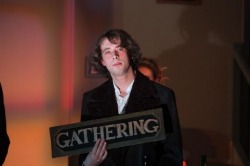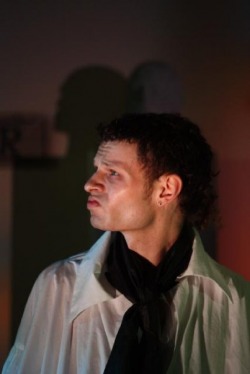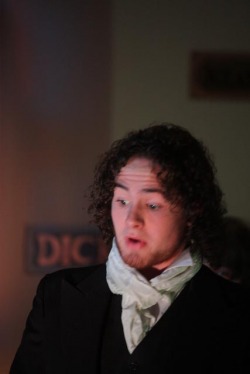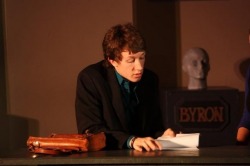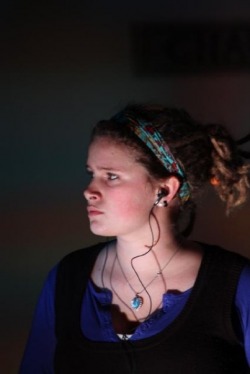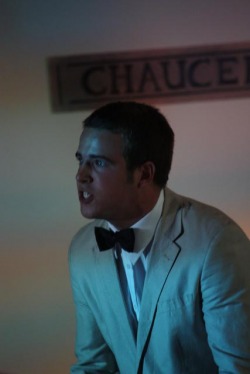POETS' CORNER
by James Huntrods
Director: James Huntrods and Nathan Wood
Producer: Emma Black
Jane: Rachel Ashwanden
Evelyn: Harriet Green
Reuben: Matt Whitehouse
Oscar Wilde: Jimmy Walters
Lord Byron: James Bober
Charles Dickens: Tom Namgauds
William Blake George Chilcott
Geoffrey Chaucer: Rob Weedall
Poets' Corner will be at the Edinburgh Festival Fringe:
Venue 88, The Caves, Cowgate
1.40pm - 6 - 23 August 2009
Tickets: £7 adults, £5 concessions Previews: £5
SYNOPSIS
"There is that in me that shall never expire"
George Gordon, Lord Byron
In a quiet corner of Westminster Abbey, Oscar Wilde and Lord Byron sit, talk and drink together whilst awaiting the start of the party. At least until the arrival of an unexpected guest. She claims to be a writer, and impossibly, she claims to be alive.
Flashbacks from her life paint the picture of an aspiring poet struggling with a difficult marriage and the pressures of modern literary fame. As the memories become more vivid we discover just how she ended up attending the ghostly party, and why the immortality of a writer may mean more than just their words.
DIRECTOR'S NOTE
Poet's Corner is one of those ideas that just came by absolute chance. I was dossing around on Wikipedia and hit the random article button and ended up on a webpage about it. And I thought 'hmm, there's an idea'. The time between that initial spark and the play itself is quite long. For ages I just had this idea of poets chatting to each other for a while and arguing about things. But it was flat and didn't seem to be going anywhere. It was only after a weekend at a University writing workshop where I sat down with other writers and worked through it that the play you'll see today was born. That was day that Jane came into being, and suddenly the play took a whole new dynamic. It was no longer a philosophical conversation between famous writers but a mystery play based around a girl trying to find out how she ended up in Poets' Corner surrounded by the greatest minds of our history. It had a purpose as a play, which is something that I think is vital in writing plays. There needs to be a purpose behind the drama, something that needs to be found out. Otherwise you guys would get bored.
I'm not sure what I'll write next. Hopefully an idea will arrive soon. Maybe I'll go hit that random article button again...
REVIEW
Leeds Student Newspaper - by Mary Doxe
The splendid architecture of the Great Hall becomes Westminster Abbey in this recent TG production, with the audience ushered in by an effusive tour guide to see the spot where luminaries such as Byron, Keats, Blake and Dickens are all entombed and commemorated. In this play the dead are no less eloquent than when alive, walking in ghostly form among the living.
The play itself gets off to a slow start, and suffers early on from some slightly clunky direction and stilted dialogue. Some wonderfully observed characterisations of Chaucer, Dickens and Blake do sit well though alongside the witty banter between Jimmy Walter’s dour and brooding Wilde, and James Bober’s superbly arch Byron, whose flair for the dramatic always kept the audience smiling. The play also handles the sub plot of an illicit relationship between lecturer and student with some care and tact, and despite some slightly awkward moments, offsets the humour with some thought provoking dialogue, and very well observed episodes which evince genuine emotion. The audience is left with a sense of gravity which more than makes up for any early shortcomings.
As Byron says in the play, “There is that in me that shall never expire”. As for Poets’ Corner, time will tell.
Leeds Student Newspaper - by Laura Rolinson
Not only does Poets’ Corner look at some of the greatest writers of our time in a new and dynamic fashion a philosophical, poignant and at times highly comical conversation between ghosts before a gathering in the Abbey, but it also looks at the immortality of literature and the life of a writer. The play centralises on the character of young creative writing student ‘Jane Gathering’, who finds herself in Poets’ Corner amongst the ghost of her idols and has to figure out how she ended up there. This becomes an interesting and ultimately well tackled aspect of the play, switching between the ghostly blue light of the literary gathering in which she is stuck and the bright white of her memories. Rachel Ashwanden, playing Jane Gathering, is key to adding to this dynamic and succeeds in doing so by switching effectively between the somewhat serious nature of her story to the comedy and philosophising of the graveyard scenes.
